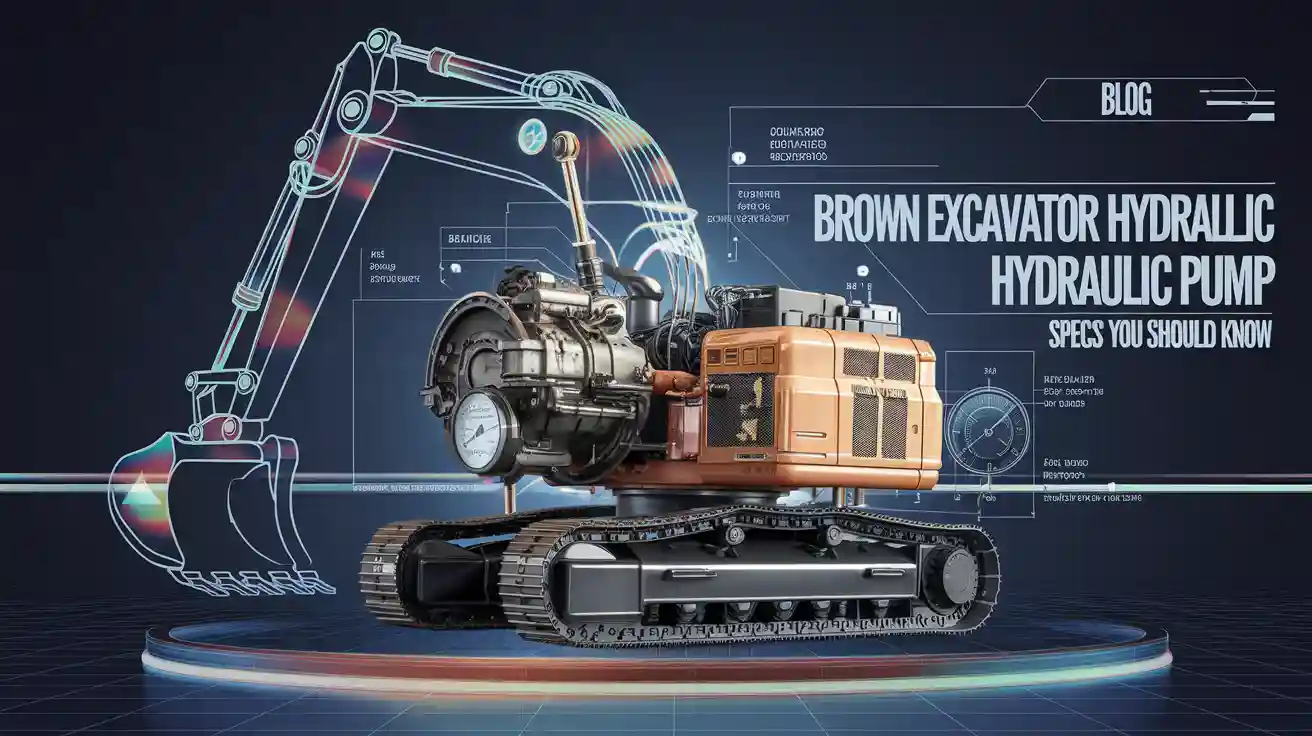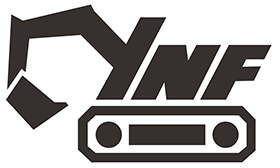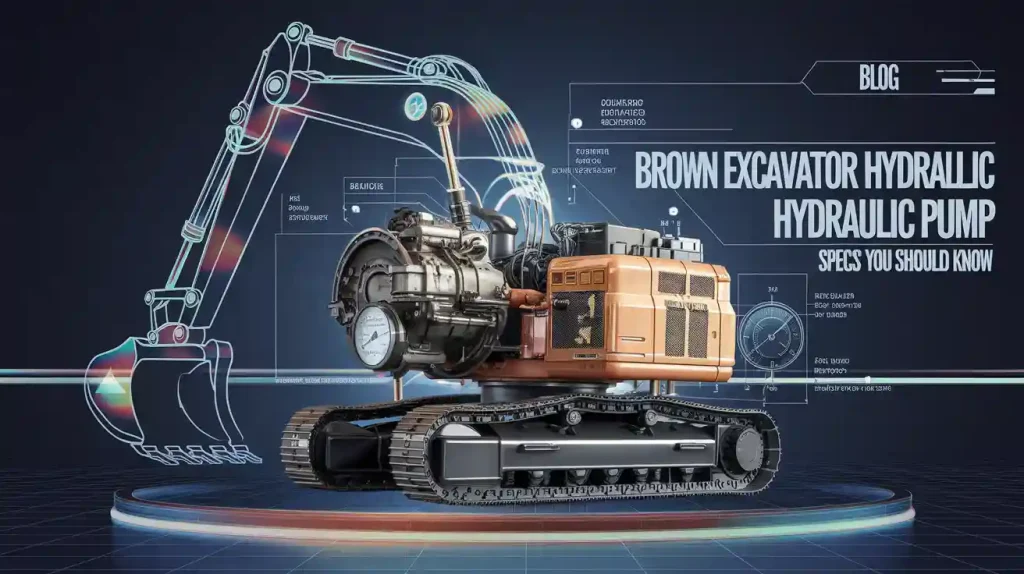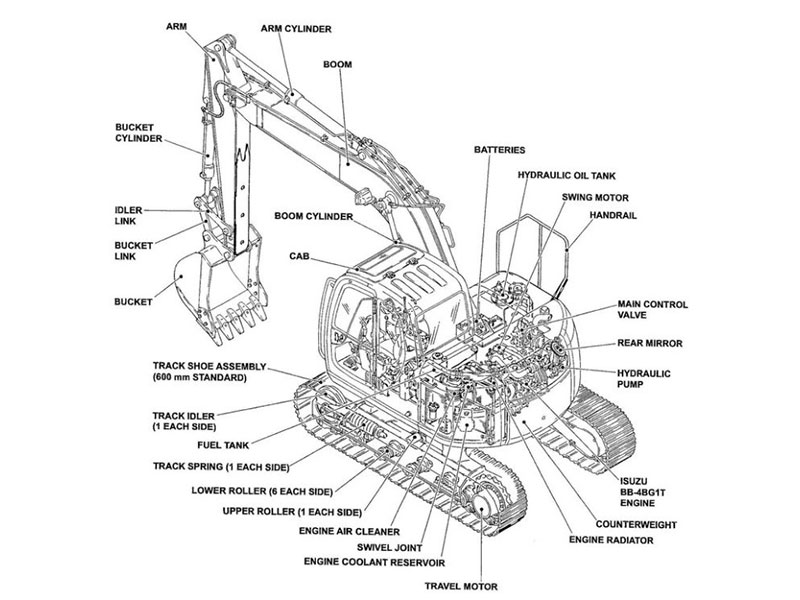
You need to check several key specs when choosing a brown excavator hydraulic pump. Look at flow rate, pressure rating, pump type, size, and the materials used. Pumps with corrosion-resistant metal last longer and handle higher pressure. Many models, like the David Brown 162703, work with top brands and offer a precise fit. Durable construction means you can rely on your pump in tough conditions.
Key Takeaways
Check the flow rate and pressure of the hydraulic pump. Make sure they fit your excavator’s needs for best work.
Pick the right pump type for your job. Piston pumps work well for high-pressure jobs. The pump size must fit your excavator.
Use strong materials like cast steel or aviation-grade aluminum. These materials help the pump last longer. They stop damage and rust.
Take care of the pump often. Clean it and change the hydraulic fluid a lot. This stops rust and keeps the pump working longer.
Always check OEM part numbers before you buy. This makes sure the part fits right and stops hydraulic problems.
Brown Excavator Hydraulic Pump Specs

Flow Rate and Pressure
When picking a brown excavator hydraulic pump, check the flow rate and pressure. These numbers show how much hydraulic fluid the pump moves and how strong it is. For example, the David Brown 162703 pump moves 16 cm³ each turn. That is about 4.14 gallons per minute at 1,000 RPM. Some pumps can move even more fluid, depending on the model. Pressure ratings can go up to 250 bar, which is about 3,625 psi. This means you can use these pumps for hard digging work.
Tip: Make sure the pump’s flow rate and pressure match your excavator. If they do not match, your machine might have problems.
Pump Type and Size
There are different types and sizes of hydraulic pumps in brown excavators. The most common types are piston pumps and plunger pumps. Each type works best for certain jobs and pressure levels. Here is a table to help you see the choices:
Type of Pump | Models Available |
|---|---|
Piston Pumps | Efficient and durable for high-pressure applications |
KYB Plunger Pumps | K3V63, K3V112, K3V180, K3V270, K5V80, K5V140, K5V160, K5V200, K5V140DT, K5V200DT, etc. |
Pump size is important, too. Small pumps fit small excavators. Big pumps are for heavy-duty machines. Always check the size and how the pump mounts before you buy a brown excavator hydraulic pump.
Material and Durability
The material of your hydraulic pump affects how long it lasts and how well it works. Most brown excavator hydraulic pumps use strong cast steel, ductile iron, or aviation-grade aluminum alloy. These materials help the pump resist damage and rust. The inside walls of the pump must be made very carefully, with tight tolerances of 0.01 to 0.02 mm. This helps the pump handle high pressure and sudden shocks.
Here is a table showing key features:
Feature | Description |
|---|---|
Material Composition | High-strength cast steel or aluminum alloy, ductile iron, aviation-grade aluminum alloy |
Structural Integrity | Inner wall must have micron-level machining accuracy (0.01-0.02 mm tolerance) |
Performance Under Pressure | Designed to withstand high-pressure moving parts and pressure pulsation shocks |
Wear Resistance | Heat treatment processes improve hardness and wear resistance |
Corrosion Resistance | Selected materials exhibit good fatigue and corrosion resistance |
Note: Pumps with heat-treated parts last longer and need less fixing.
Model Compatibility
You must make sure your brown excavator hydraulic pump fits your machine. Different models use different part numbers. For example, the David Brown 1200 Selectamatic, 1210, and 1212 use pumps like K919048 and K307058. Case IH models like 1390, 1394, 1490, and 1494 use pumps with part numbers like K944907 and K307945.
Check this table for quick reference:
Model Type | Compatible Models | Part Numbers |
|---|---|---|
Case IH | 1390, 1394, 1490, 1494 | K944907, K307945 |
David Brown | 1200 (Selectamatic), 1210, 1212 | K919048, K307058, K307945, K200330, K924459 |
Always check your excavator’s manual or ask an expert before buying a new pump. This helps you avoid mistakes and keeps your machine working well.
Performance and Efficiency
Performance Impact
It is important to know how flow rate, pressure, and build quality change how your excavator works. Flow rate shows how much hydraulic fluid moves in the system. If the flow rate is higher, your excavator can move faster and do bigger jobs. Pressure tells you how much force the system can make. When you use high pressure with the right cylinder size, your machine can lift and dig more.
Here is a table that shows how pressure and cylinder size change the force:
Machine Type | Pressure Range (PSI) | Force Output (lbs) |
|---|---|---|
1-ton machines | 3,130 – 3,555 | 9,400 (2-inch cylinder at 3,000 PSI) |
Larger models | Up to 4,980 | 37,700 (4-inch cylinder at 3,000 PSI) |
Power boost modes | 5,260 for 10-15 sec | N/A |
The formula for force is easy:Force = Pressure × Piston Area
This means both pressure and cylinder size are important. If you pick a pump with the right specs, your brown excavator hydraulic pump will give you the power you need for hard work.
Build quality matters a lot too. Pumps made with careful machining and strong materials last longer. They help your excavator work well for a long time. New hydraulic systems, like digital displacement pumps, let your machine react faster and give you better control. These new designs help you save fuel and work better.
Efficiency Ratings
Efficiency shows how well your pump changes engine power into hydraulic power. Most pumps have efficiency ratings from 85% to 95%. Here is a table with common ratings:
Model Type | Efficiency |
|---|---|
Base Model | 85% |
Advanced Model | 90% |
Pro Model | 95% |
To get the best efficiency, you need to match the pump’s specs to your job. Here are some ways to make your pump work better:
Make sure the engine and pump work well together.
Lower energy loss by reducing throttling in the system.
The right pump type gives you the flow and pressure you need without wasting energy.
Piston pumps are good for high-pressure jobs and help save fuel.
New technology, like smart control systems, makes your excavator work better and faster.
Tip: Always check what your machine needs before you pick a pump. The right choice saves fuel, helps your machine work better, and keeps it running longer.
Maintenance and Lifespan
Maintenance Needs
You need to take care of your brown excavator hydraulic pump. This helps it work well and last longer. Doing regular checks lets you find problems early. You can avoid expensive repairs if you do this. Cleaning the pump and changing the hydraulic fluid are very important. Dirt, water, and chemicals can get inside the fluid. These things can cause rust or damage inside the pump. If you do not clean and change the fluid, the pump might break sooner.
Here are some common reasons pumps stop working:
Not doing maintenance the right way
Not cleaning well during service
Hydraulic fluid gets dirty with water, dust, air, or chemicals
Using the equipment wrong, like overloading
Working in very hot, cold, or dusty places
Parts wearing out from daily use
You should follow the schedule in your excavator’s manual. Look for leaks and listen for odd sounds. Check the pump for any signs of damage. If you pick the right pump size, pressure, and flow rate, you lower the chance of overheating and leaks. This also helps you spend less on repairs and keeps your excavator working well.
Tip: Clean the pump and change the fluid often. Doing this can help your pump last many more years.
Service Life
How long a brown excavator hydraulic pump lasts depends on how you use and care for it. Most pumps work for 10,000 and 20,000 hours. This number changes with how you treat the pump and where you use it.
Pumps made with strong materials, like cast steel or aviation-grade aluminum, last longer. Some pumps, like the Optimum Series gear pumps, use special bushings. These bushings wear out slower than roller bearings. These features help pumps work well in tough jobs and hard places.
Feature | Impact on Lifespan |
|---|---|
High-quality materials | Help stop damage and rust |
Patented bushing design | Slow down wear, make pumps last longer |
Proper sizing and rating | Lower stress and breakdowns |
Find problems early, stop failures |
If you take care of your pump and use it the right way, it can last a long time. Always pick a pump that fits your excavator. This helps you avoid lots of repairs and keeps your machine working for years.
Choosing the Right Pump
Application Fit
You need to match the hydraulic pump to your excavator and the work you plan to do. Start by checking your machine’s make, model, and the type of jobs you handle. Each excavator has its own needs for flow rate, pressure, and pump type. For example, a small excavator may need a lower flow rate, while a larger one needs more power for heavy digging.
Look at your equipment’s manual. Find out the engine horsepower, operating weight, and hydraulic system requirements. These details help you choose a pump that fits your machine and job. If you use the wrong pump, your excavator may not work well or could break down.
Tip: Always use the correct OEM part number for your pump. This ensures a perfect fit and keeps your hydraulic system running smoothly.
Selection Tips
When you select a brown excavator hydraulic pump, keep these important points in mind:
Check OEM Part Numbers:
OEM part numbers make sure the pump matches your excavator model.
They guarantee the pump meets the manufacturer’s quality standards.
Using the right part number lowers the risk of hydraulic problems.
Review Performance Needs:
Know your machine’s flow rate, pressure, and speed requirements.
Choose the right pump type (piston, gear, or vane) for your job.
Make sure the pump can handle the hydraulic fluid you use.
Consider Quality and Support:
Pick pumps from trusted brands with good reviews.
Make sure spare parts are easy to find.
YNF Machinery offers reliable pumps and support for many excavator models.
Plan for Maintenance:
Choose a pump that is easy to install and maintain.
Check that you can get replacement parts when needed.
Step | What to Do |
|---|---|
1. Identify Specs | Check your excavator’s manual for requirements. |
2. Match Part # | Use the correct OEM part number. |
3. Confirm Fit | Make sure the pump fits your model and job. |
4. Choose Supplier | Select YNF Machinery for quality and support. |
Using the right pump helps your excavator work better and last longer. Take your time to compare specs and always double-check compatibility.
When you choose a brown excavator hydraulic pump, you make a big difference in how your machine works and lasts. You should focus on these key points:
Flow rate and pressure must match your system for top performance.
The pump must work with your hydraulic fluid to avoid damage.
High efficiency helps you save energy and money.
You also need to check for durability and fit:
Scratches or dents can cause leaks.
Extreme temperatures may weaken materials.
Good tolerances keep everything aligned and sealed.
Always read your manual or ask an expert before you buy. This helps you pick the right pump and keep your equipment running strong.
FAQ
What is the flow rate of a typical brown excavator hydraulic pump?
Most pumps move about 16 cm³ each turn. At 1,000 RPM, this is close to 4.14 gallons every minute. Always look in your excavator’s manual for the exact flow rate.
How do I know if a hydraulic pump fits my excavator?
Match the OEM part number from your manual. This helps make sure the pump fits and works well. If you are not sure, you can ask YNF Machinery for help.
What materials make brown excavator hydraulic pumps durable?
Manufacturers use cast steel, ductile iron, or aviation-grade aluminum alloy. These materials help stop wear and rust. Pumps with heat-treated parts last longer in hard jobs.
How often should I service my hydraulic pump?
Check and clean your pump every 500 hours of use. Change the hydraulic fluid often. Look for leaks or strange sounds each time you check.
Where can I buy a reliable brown excavator hydraulic pump?
You can buy a good pump from YNF Machinery. They sell quality pumps and give support for many excavator models. Always make sure the pump fits your machine before you buy.





